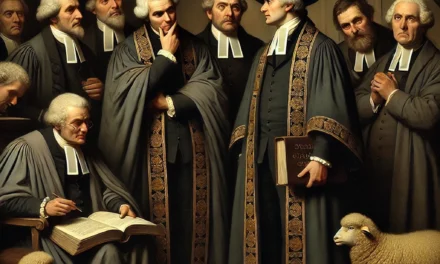Article 2: Sola Scriptura vs. Modern Textual Criticism
Thesis: Modern textual criticism undermines Sola Scriptura by placing the authority of textual scholars above the witness of the Holy Ghost in the Church.
Introduction
Sola Scriptura—“Scripture alone”—stands as a defining principle of the Protestant Reformation. It declares that the Holy Scriptures are the sole infallible rule of faith and practice for the Church. This foundational doctrine separates biblically faithful Christianity from all systems that elevate human tradition or academic expertise to a place of ultimate authority. In Sola Scriptura, the Church acknowledges that it is God Himself who speaks in Scripture and that every believer, indwelt by the Holy Ghost, may hear and submit to the voice of God in His written Word.
Modern textual criticism, however, challenges this sacred principle. By subjecting Scripture to a shifting set of academic theories, textual critics assume a position of final arbiter over God’s Word. They propose that the Church—and, implicitly, the Spirit of Truth—has erred in preserving the text for nearly two thousand years. In their quest to recover a supposedly “lost original,” they supplant the sure witness of the Holy Ghost and enthrone the subjective judgments of scholarship. This second article in our series will expose how modern textual criticism undermines Sola Scriptura, transforming it into what we might call Sola Academia. It will also examine a telling case study in Matthew 5:22, where the Critical Text’s omission of the phrase “without a cause” alters the theological and ethical implications of the Lord’s command. Finally, we will show that textual decisions are never theologically neutral. When the Church abandons the witness of God’s Spirit in favor of man’s rationalistic theories, it sacrifices the very essence of biblical authority.
I. Defining Sola Scriptura vs. Sola Academia
1. Sola Scriptura
Sola Scriptura stands upon the conviction that the Bible alone is the God-breathed (2 Timothy 3:16) and providentially preserved revelation of God to His people. Its authority transcends all councils, traditions, and human reasonings. The Reformers, from Luther to Calvin, held that Scripture interprets itself, that the Holy Ghost speaks directly through the text, and that the Church recognizes Scripture for what it is, rather than granting it authority. In other words, God’s Word possesses inherent authority by virtue of its divine authorship.
Under Sola Scriptura, the Bible is not merely one authoritative source among many: it is the final and infallible arbiter of all doctrinal and moral questions. As Psalm 119:105 states, “Thy word is a lamp unto my feet, and a light unto my path.” When controversies arise, believers must turn to Scripture to judge all claims, opinions, and traditions. The prophet Isaiah emphasized this principle when he declared, “To the law and to the testimony: if they speak not according to this word, it is because there is no light in them” (Isaiah 8:20). Hence, the Church has always stood or fallen on the reliability, clarity, and sufficiency of Scripture.
2. Sola Academia
In contrast to this Reformation principle, modern textual criticism unwittingly promotes Sola Academia. Within this framework, ultimate authority shifts from the providentially preserved Word of God, as recognized by the Spirit-led Church, to the ever-changing hypotheses of scholarly consensus. Textual critics sift manuscripts, weigh their relative antiquity, and propose canons of criticism derived from Enlightenment rationalism. Each generation’s leading scholars feel entitled to reassess the text, effectively casting the final verdict on what “counts” as Scripture.
Under Sola Academia, the question “What is written in Scripture?” depends upon the latest critical edition—an edition that, by design, changes with new discoveries or evolving theories. By denying the surety of a preserved text and substituting scholarly reconstruction, modern textual criticism places the Church in perpetual uncertainty. Instead of receiving the text by faith, anchored in the promises of God (Matthew 24:35; Psalm 119:89), believers are exhorted to trust the fluid conclusions of academic experts. The Holy Ghost’s witness is subordinated or dismissed, while the ascendancy of higher learning becomes functionally absolute.
II. The Historical Testimony of the Reformers on Textual Authority
1. The Reformation’s Return to the Text
The Reformers championed Sola Scriptura by returning to the original languages of Scripture, producing vernacular Bibles based on the text they recognized as authentically preserved throughout church history. Martin Luther translated the Scriptures into German, using the best editions available, while John Calvin’s Geneva Bible drew from the Received Text tradition. Likewise, William Tyndale’s seminal English translation reflected the Greek text commonly referred to as the Textus Receptus, the manuscript tradition that would come to be known and widely disseminated under that title.
Critically, the Reformers did not undertake these translations as modern textual critics do, with the assumption that Scripture had been lost or hopelessly corrupted. Rather, they held that God’s Word was available and reliably preserved within the extant manuscripts and the ecclesiastical tradition that had disseminated them. They regarded their textual work as a matter of clarifying and standardizing the well-attested text of Scripture, not of reconstructing a text that had supposedly vanished.
2. The Confessional Consensus
The confessions born of the Reformation era, especially the Westminster Confession of Faith and the London Baptist Confession of Faith, solidified a unified front concerning the authority of Scripture. Westminster Confession of Faith 1.8 declares that the Scriptures were “kept pure in all ages,” underscoring the Reformers’ trust in God’s providential hand. These confessions do not imagine that the Church needed a future cadre of textual experts to supply missing portions or restore lost words. Rather, they affirm that the Word of God was never lost, never at the mercy of scribal chaos, but remained “by his singular care and providence” safeguarded for the Church.
This confessional stance is diametrically opposed to modern textual criticism, which operates on a reconstruction paradigm. Under that paradigm, the Church supposedly possessed an inferior text for centuries—if not millennia—until recent academics could restore the “earliest attainable text.” Such a view effectively repudiates the Reformers, who explicitly taught that the Word, as they had received it, was indeed the uncorrupted Word of God.
III. How Textual Criticism Has Shifted Authority from the Spirit-Led Church to Unbelieving Academia
Modern textual criticism did not arise in a vacuum; it was birthed during the Enlightenment, an era that elevated human reason above supernatural revelation. As secularism grew, scholars began to treat the Bible as they would any other ancient text, subjecting it to the same methods used for classical works such as Homer or Plato.
1. The Underlying Presuppositions
This approach is grounded in rationalistic presuppositions that reject, or at least marginalize, divine providence. It assumes that scribes and copyists inevitably corrupted the text, that the earliest manuscripts—sometimes discovered in places detached from the believing community—are inherently more reliable, and that thoroughgoing naturalistic criteria must be applied to discern the “original.” Under these presuppositions, the Spirit’s historical witness within the Church is barely factored in, if at all.
2. Replacing the Church’s Witness with Secular Institutions
Where the Church once recognized the canonical text by the Spirit’s internal testimony, modern textual criticism places the final judgment in the hands of academia. University departments and scholarly guilds, often indifferent or hostile to orthodox Christianity, are deemed the new custodians of Scripture. Believers, then, are compelled to look outside the Church—to journals, critical apparatuses, and committees—for authoritative pronouncements about the text. In practice, this exalts the voice of men above the Spirit’s voice in the congregation of the faithful. The text is no longer affirmed by virtue of God’s promises; it is tentatively accepted with the caveat that tomorrow’s findings may revise it yet again.
3. The Consequences of Shifting Authority
The repercussions are manifold. First, believers lose confidence in the stability of God’s Word. The plain reading of passages in the Authorized Version, used devotionally and liturgically for centuries, is now subject to the disclaimers: “This might be a later addition” or “More reliable manuscripts read differently.” Second, the Church’s testimony is weakened, as the impression spreads that Scripture itself is uncertain, thereby justifying the modernist claim that no doctrine is safe from perpetual revision. Lastly, the Holy Ghost’s authority is functionally denied. If the Church was deceived about the text, it implies the Spirit failed in guiding the faithful into the truth (John 16:13), a notion that no serious believer can accept.
IV. Matthew 5:22: The ‘Without a Cause’ Variant and the Doctrinal Shift
A key illustration of the theological and ethical impact of textual choices is found in Matthew 5:22. In the Authorized Version, the Lord Jesus warns: “But I say unto you, That whosoever is angry with his brother without a cause shall be in danger of the judgment…” (Matthew 5:22, AV). The clause “without a cause” has been present in the vast majority of Greek manuscripts and in the teaching of the historic Church. It tempers the universal condemnation of anger by specifying unjust anger as the real crime.
1. The Authorized Version Reading
The phrase “without a cause” carries significant ethical and theological implications. It recognizes that there is such a thing as righteous anger. Scripture indicates multiple instances of just indignation. The Lord Jesus Himself displayed anger at the moneychangers in the temple (Matthew 21:12–13) and expressed anger against the Pharisees’ hardness of heart (Mark 3:5). The psalmist famously declares, “Ye that love the LORD, hate evil” (Psalm 97:10). Christian love and righteous anger can coexist when one is zealous for the holiness of God. By including “without a cause,” the AV reading harmonizes the Sermon on the Mount with the broader biblical witness that condemns sinful anger while upholding righteous anger in the face of sin.
2. The Critical Text’s Omission
Modern Critical Text editions frequently omit “without a cause,” presenting the verse as: “But I say unto you, That whosoever is angry with his brother shall be in danger of the judgment…” This reading, drawn predominantly from a smaller subset of manuscripts that textual critics deem superior, drastically alters the teaching of Jesus, suggesting that all anger, in every context, is sinful. Such a perspective creates an apparent conflict with other scriptural passages where anger against evil is commended.
Moreover, a moral and theological conundrum arises: Jesus Himself expressed anger. Under the Critical Text’s reading, one might deduce that the Lord is pronouncing a blanket condemnation of anger, which could be twisted to imply that Jesus sinned if one is not careful to note the context. Even if some textual critics claim this tension can be resolved, the mere existence of the conflict underscores that textual variants are not theologically neutral. The final text that believers read in their Bibles carries direct doctrinal consequences.
3. The Shift in Doctrine
If the Church for nearly two millennia taught that only anger “without a cause” is condemned, then the removal of these words signifies a major doctrinal shift. It is no minor detail; it touches on the nature of sin, the purity of Christ, and the believer’s call to love righteousness and hate evil. This shift exemplifies how modern textual criticism, under the assumption of Sola Academia, can present believers with a distorted reflection of Christ’s teaching. When the text changes, doctrine changes.
V. Why This Issue Is Not Neutral—Textual Choices Shape Doctrine
Textual critics often claim they are simply trying to uncover the original reading and that their work is theologically neutral. Yet every textual choice inevitably carries doctrinal and pastoral weight. If God’s people are called to live by every word that proceedeth out of the mouth of God (Matthew 4:4), then the presence or absence of words matters profoundly.
Scriptural Authority
When textual critics decide which readings are “authentic,” they functionally determine what is regarded as Scripture. If an entire phrase in the Sermon on the Mount is omitted, it does not merely alter a footnote; it influences how millions of Christians understand and practice their faith. The question of anger, for instance, can lead to confusion about the nature of righteousness and sin.The Church’s Confession
Doctrinal formulations—on issues ranging from Christ’s person and work to ethics—rest upon specific texts of Scripture. If textual critics uproot these texts, the Church’s confessions and catechisms are inevitably called into question. If we yield to the idea that the text must be judged by external criteria, then we have effectively allowed human theories to scrutinize the foundation of Christian belief.Believer’s Confidence
Faithful Christians derive assurance from the certainty that the text of Scripture in their hands accurately represents God’s Word. When an endless parade of new critical editions emerges, each adjusting or revising certain verses, believers may struggle to trust that they hold the authentic voice of God. This crisis of confidence fosters theological liberalism, as the seeds of doubt are sown in the Church.God’s Character
Above all, this is a question of God’s character. If He promised preservation (Psalm 12:6–7) but failed to deliver, how can we trust Him for salvation, sanctification, or any of His other promises? Sola Scriptura contends that God is true and faithful, ensuring that His Word has remained available and reliable in the Church. Modern textual criticism, by teaching that crucial words and phrases were lost until discovered by twentieth-century scholars, subtly suggests God neglected to protect His revelation.
VI. Conclusion
Modern textual criticism cannot be harmonized with the Reformation principle of Sola Scriptura. At its core, Sola Scriptura proclaims that the Word of God stands supreme, recognized and confirmed by the Holy Ghost among God’s people. This principle was never intended to cede final authority to experts armed with conjectural canons. Yet that is precisely what happens when we adopt the Critical Text over the Received Text: we grant a special priesthood of scholars the power to determine the boundaries of Scripture.
Nowhere is this tension clearer than in the example of Matthew 5:22. The removal of “without a cause” in the Critical Text is no minor editorial tweak; it raises doctrinal questions about Christ’s own holiness, Christian ethics, and the nature of just anger. Similarly, countless other variants—whether large (like the ending of Mark or the Pericope Adulterae) or small—carry theological consequences. Modern textual criticism’s posture that these changes are “neutral” is naïve at best and disingenuous at worst. Textual choices shape doctrine because every jot and tittle of Scripture is God-breathed.
Furthermore, the logic of Sola Academia raises a grave accusation against the Holy Ghost and the Church. If the correct text was lost for centuries and only recovered by the intelligence of modern scholarship, then the Spirit did not guide the Church into all truth (John 16:13). God’s promises of preservation (Matthew 24:35) and the Reformers’ confident stance on the purity of Scripture ring hollow. This indictment leads inevitably to skepticism about God’s faithfulness and truthfulness.
But Sola Scriptura stands as an impregnable fortress against such assaults. The Reformers trusted that the text they received—later known as the Textus Receptus—was indeed the authentic, providentially preserved Word of God. They believed the Holy Ghost did not lie to the Church nor allow it to remain in darkness regarding the very Scripture by which men are saved and sanctified. Their stance remains unassailable for any who affirm that God is both sovereign and faithful.
In the final analysis, the debate over modern textual criticism is not a trivial matter of academic tastes. It is a battle for the soul of biblical authority. If the Church surrenders the sure foundation of the Spirit-confirmed text for a restless cycle of scholarly reconstructions, it forsakes the very principle that birthed the Protestant Reformation. Believers must choose: will they stand with Sola Scriptura, acknowledging God’s promises and the Spirit’s guidance, or will they bow to Sola Academia, perpetually dependent on the counsel of shifting scholarly opinions?
The stakes could not be higher.
- To undermine the text is to undermine the Word of God and its final authority.
- To place man’s wisdom above the Spirit’s witness is to overturn Sola Scriptura.
- To remove phrases like “without a cause” is to change doctrine and distort the teaching of Christ.
- To elevate the Critical Text is to discredit the Church’s confidence in the Holy Ghost’s guidance.
Let every believer who loves God’s Word reaffirm that Scripture is absolutely authoritative, fully preserved, and not subject to the arbitrary rulings of human scholarship. Let the Church reject the notion that divine truth lay hidden until uncovered by academics in the nineteenth or twentieth centuries. God’s Word has been entrusted to the Church from the beginning, and the Spirit of Truth has not deceived us.
If Sola Scriptura is true, then God’s promise never fails, His providential care is steadfast, and the text used and believed by the faithful for centuries is indeed the genuine Word. It is time to forsake the illusions of Sola Academia and return to the Reformation’s biblical standard: “Scripture alone” as the final, infallible rule of faith and practice, standing on the rock-solid foundation of the Holy Ghost’s witness, rather than the fleeting opinions of modern critics.




